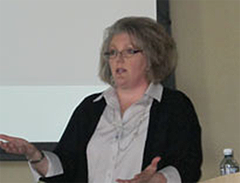Survey points to ways of improving professional climate for women faculty
Mary Coussons-Read, associate vice chancellor for Research and Creative Activities, speaks at a workshop, "Gender and Campus Climate.”
When it comes to issues of recruitment, retention and promotion of women faculty, there is much being done well but still room for improvement.
That’s the takeaway message of a survey that looked into the professional climate on the University of Colorado Denver campus. Mary Coussons-Read, Ph.D., associate vice chancellor for research and creative activities, Research Administration, spoke Monday at a workshop titled “Gender and Campus Climate.” The luncheon was hosted by the university's Women's Issues Committee.
A National Science Foundation grant, administered by the NSF's ADVANCE program, supported a survey to find out how the university supports women faculty in STEM (Science, Technology, Engineering and Math).
"We (the ADVANCE project and the Office of the Associate Vice Chancellor for Faculty Affairs) decided to look at all faculty on campus," Coussons-Read said. "What we found is that we're doing a lot of things really well, and then we have some opportunities to improve the climate for everybody and that there are some really good practices out there that we can employ to further support all CU Denver faculty and the campus community as a whole."
Tenure and non-tenure track faculty from all schools and colleges on the Denver Campus were eligible to participate – 218 took part -- in the survey, which was conducted from April to the start of June 2011. Coussons-Read went through some of the survey results for the Women's Issues Committee.
Coussons-Read said the grant was awarded to her as a faculty member in the College of Liberal Arts and Sciences. "Although this ADVANCE grant supports efforts focused on the Denver Campus, there are a lot of things that we can learn from this for the entire university."
She said Institutional Research also is working on the project, working with the ADVANCE project to look at patterns of hiring and promotion among faculty.
"We're also looking at policies that are in existence with the idea that we'll be able to submit an Institutional Transformation proposal to NSF in a couple years," Coussons-Read said. "Such grants are quite large and support institutions in coming at these issues of climate, not just for women faculty, but for all faculty on campus."
She said the next step is to put together a working group to discuss issues related to the grant application.


